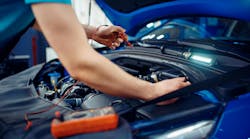Ultrasound scans have long been a fundamental tool in healthcare for looking inside the human body, but they have never before been put to use in testing the health of a modern combustion engine, according to the University of Sheffield in Sheffield, U.K.
In the University of Sheffield’s department of mechanical engineering, Rob Dwyer-Joyce, professor of lubrication engineering, has devised a method of using ultrasound to measure how efficiently an engine’s pistons are moving up and down inside their cylinders.
“There is a real urgency, now, to improve energy consumption in cars,” said Prof. Dwyer-Joyce. “Our method will allow engine manufacturers to adjust lubrication levels with confidence and ensure they are using the optimum level for any particular engine, rather than over-lubricating to ensure engine safety. The energy used by the piston rings alone amounts to around 4p in every litre of fuel – there is a lot at stake in getting the lubrication right.”
The seal between piston rings and cylinder is the most important seal in the entire engine and understanding how the lubricant works inside this sealed chamber is crucial for improving the fuel efficiency of the engine.
The movement of the pistons is what drives the car forward. Car manufacturers have to calculate how much oil will allow the piston to move efficiently. Too much oil is wasteful and ends up getting burnt in the engine – increasing emissions, while too little will result in wear from the two moving parts rubbing against each other.
Because cylinders are enclosed spaces, it is not easy to test what is going on inside. Computer models don’t effectively allow for changes as an engine speeds up and gets hotter, and more invasive methods – cutting open the cylinder – interfere too much with the mechanism to get an accurate test result.
The Sheffield team are measuring the lubricant film by transmitting ultrasonic pulses through the cylinder wall from sensors attached to the outside. The reflections from these pulses can then be recorded and measured.
The research is part of a project funded by the Engineering and Physical Sciences Research Council. It has included collaboration with Loughborough University, which is overall leader on the project, and Cranfield University, and a host of automotive industry manufacturers and suppliers. The research team at Loughborough is investigating the piston-cylinder dynamics and tribological modelling, the development of predictive tools, advanced cylinder liners and surface laser texturing, and the direct measurement of friction, whilst the team at Cranfield have been studying the micro-scale interaction between the piston rings and the cylinder.
The team is ready to commercialise this technology and is looking for industrial partners who might be interested in pursuing the approach.
“Our system could provide major efficiency savings in car engines, but it could also be used on the larger diesel engines in deep water marine vessels, some of which use up to 1 tonne of oil each day,” added Prof. Dwyer Joyce.

